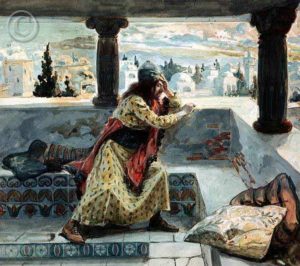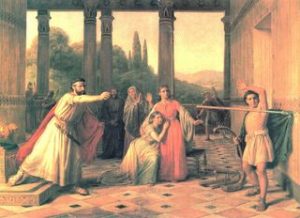Psalm 60 and 2 Samuel 8

As a parent what was the worst fight you had with your child, or perhaps it was the other way round? In our household it was over worm medicine. Worms are a topic that most of us prefer not to mention in public but something a lot of us have had to deal with in private. I am not sure if children lock on to parents’ tension over this. I remember vividly the semi-secret whispered request over the pharmacy counter if they stock medicine for worms and then the absolutely toe-curling embarrassment as the pharmacist loudly proclaims the whole family must take the treatment. I was then told not to worry as it was a delicious strawberry flavour. The truth is the taste of the medicine was revolting and nothing at all like strawberries. As dutiful parents we made a show of cheerfully swallowing our dose. The first child opened their mouth and spat it across the room. There then began one of the biggest family scenes I remember that ended with our rolling around on the floor with our child trying to wrestle a spoonful of medicine into him. It was a ridiculous humiliation of parenthood, easily rectified the next day by buying tablets crushed into copious quantities of jam. God’s discipline of his people is like worm medicine, unwanted and unpleasant but good for you.
Psalm 60 relates to a time when David was defending Israel against invasion on multiple fronts and is described in 2 Samuel 8. The enemies were the Philistines, Moabites and Edomites. David believed God who had promised to go with the Israelites into battle had left them v10 and it was God who had previously given them victory. The nation had in some way rejected God and now they were experiencing his discipline by God removing his presence from them. It had become a national emergency, so David prayed, ‘You have rejected us, God, and burst upon us; you have been angry – now restore us! You have shaken the land and torn it open; mend its fractures, for it is quaking. You have shown your people desperate times; you have given us wine that makes us stagger.’ vv 1-3 Some might interpret a psalm like this today as God causing a pandemic to punish countries for sinful disobedience and rejection of God; in much the same way as some said Aids was God’s punishment against homosexuality. This I believe is an entirely false understanding of scripture. The Old Testament should be read in the light of Jesus’ life, sacrificial death, teaching and example.
David responded appropriately, as the representative of God’s people he threw himself entirely on God’s mercy. ‘Save us and help us with your right hand, that those who you love may be delivered.’ v5 God’s reply was that he was not only the God of Israel, he was also God over all nations. vv 6-8 David then faced up to the fact that the nation had become proud and thought they could achieve victories without God’s help. He confessed their own helplessness to do so and their need of God. ‘Give us aid against the enemy, for human help is worthless. With God we will gain the victory, and he will trample down our enemies’. vv 11,12
The New Testament reveals there are still times when God needs to discipline his people. Not this time in national battles as his people are now spread across the nations. No this is a battle for holiness. In Revelation 2 and 3 the risen Christ addresses words of discipline to seven churches located in modern Turkey. He repeatedly opens his words with, ‘I know your deeds’. God’s discipline was addressed to the local church as a whole and formed from his intimate knowledge of the church. He both affirms their obedience and details their failings. He cautions the church in Ephesus, ‘Consider how far you have fallen! Repent and do the things you did at first. If you do not repent, I will come to you and remove your lampstand from its place.’ Rev 2.5 The Spirit would withdraw from the church and it would die. The church in Laodicea had become like Israel in Psalm 60, self-dependent and not trusting in God. The Spirit warned them of the risk of their losing his presence, ‘Because you are lukewarm – neither hot not cold – I am about to spit you out of my mouth. You say, ‘I am rich; I have acquired wealth and do not need a thing. But you do not realize that you are wretched, pitiful, poor, blind and naked. I counsel you to buy from me gold refined in the fire … Here I am! I stand at the door and knock. If anyone hears my voice and opens the door, I will come in and eat with that person, and they with me.’ Rev 3.16-20
God’s discipline in both the Old and New Testaments is relational.
How much do we prize our relationship with God?
Have we experienced God’s discipline in our lives reflected in our relationship with him?
Do we grasp the grace of God in always wanting to restore our relationship with him.
I will offer up my life – Matt Redman



